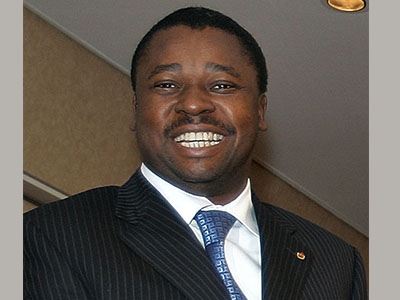
Togo’s incumbent President Faure Gnassingbe has extended a strong lead over his main rival in a weekend poll, according to the latest partial results issued Tuesday.
Gnassingbe looked poised to win a third term, with 69 percent of the vote against almost 18 percent for challenger Jean-Pierre Fabre, according to figures from the Independent National Electoral Commission (CENI).
Gnassingbe’s family has ruled the small west African country for almost half a century.
Despite international monitors calling the vote free and transparent, opposition members have accused the government of engaging in elections fraud to try to hold on to power.
The president, who first came to power in 2005 on the death of his iron-fisted father Gnassingbe Eyadema, saw his bid for a third term sharply boosted by overwhelming support from the north of the country, a family stronghold.
Figures released so far by the CENI cover about 26 percent of the estimated number of voters in Saturday’s election.
Tchaboure Gogue, one of three candidates from small opposition parties who chose to take on both Fabre and the president, also found support in his native north.
The university professor is running third with eight percent of the votes.
The main opposition Combat for Political Change (CAP 2015), which backs Fabre but is a divided and fractious coalition of five parties, has accused the regime of elections fraud.
“It’s always been by force: attacks, ballot-stuffing, fraud… that the Gnassingbe family has managed to stay in power for 50 years,” CAP 2015 spokesman Eric Dupuy told AFP.
– No term limits –
However the African Union, which sent 43 observers to monitor the election, concluded that voters had been allowed “to choose their president… freely and in transparency”.
Amos Sawyer, the head of 100 monitors sent by the 15-nation regional bloc ECOWAS on Sunday said the vote had overall been “free, transparent and organised in an acceptable manner”.
The EU, Togo’s leading international lender, said Tuesday the election “went off calmly, confirming the Togolese people’s attachment to democracy.”
The electoral commission has yet to release any results from the capital Lome, a bustling port city on the Gulf of Guinea that has historically been an opposition stronghold.
John Dramani Mahama and Alassane Ouattara, presidents of Ghana and Ivory Coast respectively, arrived Tuesday in Lome, where they were to meet the presidential candidates and “take stock of the electoral process”, Togo’s presidency said.
Nationwide, the CENI has estimated turnout at between 53 and 55 percent, markedly lower than the rate of almost 65 percent in 2010, when Gnassingbe beat Fabre.
The army provoked an outcry when it first rushed Gnassingbe into office after General Eyadema died in February 2005, leaving a power vacuum following his rule of 38 years.
Gnassingbe swiftly stood down and an election was hastily organised, which saw him win his first five-year term in a land that was previously administered by Germany then France.
Togo celebrated 55 years of independence on Monday.
Currently there are no limits on the number of times a president can stand for re-election. The opposition wants a two-term limit.



